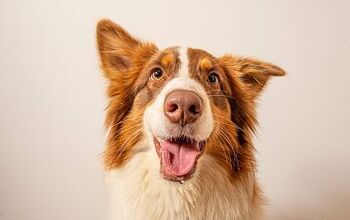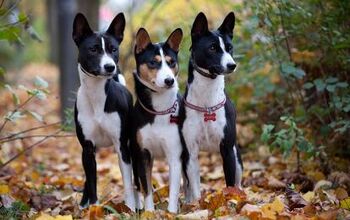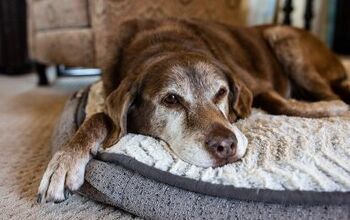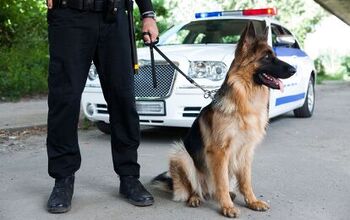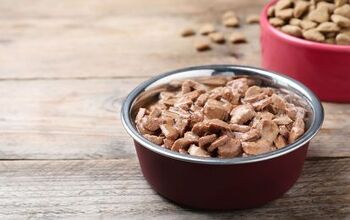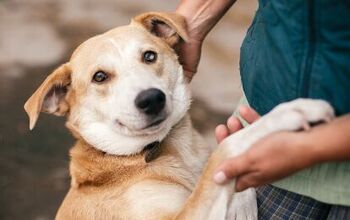Golden Shepherd


About Golden Shepherd
The beautiful Golden Shepherd brings together the smarts of the devoted German Shepherd Dog and the gentle nature of the loving Golden Retriever with the end result being a fantastic family dog that gets along with everyone including kids and once socialized, with other family pets and even dogs. This pooch thrives on human interaction and while you will certainly have a dog that considers himself a big part of the family and is therefore up for any activity, he can also suffer from separation anxiety when left on his own for long periods of time. The Golden Shepherd is a super alert dog that is not aggressive but will be quick to bark if he feels it’s warranted. And because this handsome boy is such an active, intelligent pooch, boredom and restlessness can result in destructive behaviors if his need for physical exercise and mental stimulation aren’t met.
The devoted Golden Shepherd brings the gentle nature of the Golden Retriever and the loyalty of the German Shepherd Dog together for a great family pet.
With the Golden Shepherd, you have two well-known breeds that together have produced what is known as a Designer Dog. As a result, this pooch likely dates back only 30 or 40 years to the 1980s when breeders first began crossing two or more pure-breds to produce a dog that is typically healthier, sometimes non-shedding and often smaller and gentler than many of the popular breeds of the day. With the Golden Shepherd, his parent breeds are the well-known German Shepherd Dog that was originally developed in Germany at the turn of the last century for guarding sheep. Since that time, this dog’s ability to train easily, follow instructions and devout loyalty has made him a favorite in the military and police services where they are used for tracking scents and scout duty. The Golden Retriever on the other hand was developed in Scotland back in the middle of the 19th century for use as a hunting dog that could not only retrieve downed birds on land but also in frigid water, returning the waterfowl to the hunter without crushing or damaging the bird. Today, this gentle, sweet dog comes in an American, Canadian and British variation – each as sweet and amiable as the other.
As a result of the American Kennel Club (AKC) being committed to advocating for pure-bred dogs over mixed breeds, a Designer Dog such as the Golden Shepherd doesn’t qualify to join its coveted registry. That said, both of this dog’s parent breeds are long time AKC members who have also proven to be favorite North American breeds. The Golden Retriever was inducted into the AKC’s “sporting” group back in 1925 and is described as a friendly, intelligent and devoted dog. The German Shepherd Dog became a member of the “herding” group in 1908 and he’s considered to be a confident, courageous and smart boy.
Particularly with dogs that are known to be prone to joint issues, it’s important that their diet be controlled to prevent over-eating and obesity – which will wreak havoc on hip and elbow joints later in life. Because the Golden Shepherd is such a dog you should be feeding him a kibble that is rich in the nutrients this active boy needs to remain healthy and keep up his energy levels. Look for foods that are specifically designed for a larger dog of his age, size and activity level and that are higher in proteins and lower in fillers such as carbohydrates. Fillers in a dog’s food simply cause him to want to over-eat to feel full and no pet parent wants their dog to be continually hungry and looking for something he can sneak – such as the cat’s kibble. As the Golden Shepherd may also be prone to bloat, it’s important he not be fed large volumes of food all at once or be allowed to free-feed. Provide him with 2 to 3 smaller meals staggered throughout the day with exercise planned for no sooner than 1 hour after feeding.
The energetic Golden Shepherd thrives on human interaction and being part of his family’s activities.
This is a dream dog to train because he comes from two super intelligent breeds that are both people-pleasers. They are quick to pick up and obey commands with little need for repetition, which makes training go quickly. Remember that socialization – particularly with a larger dog who can become a nuisance in leash-free zones if he doesn’t know how to play nice – is a key part of the training process. With the Golden Shepherd this needs to begin when he is very young through exposure to new sights, sounds and situations including puppy training classes to encourage a comfort level with different experiences and discourage anxious behaviors. This dog will also need a strong pack-leader, so ensure you establish rules and behaviors early on and take a firm, fair, and consistent approach to enforcing them. As with most dogs, a positive, rewards-based approach that offers up plenty of treats and praise to let him know when he’s done a good job, is sure to net you the results you’re seeking and make you both happy.
Coming from two larger dog breeds, you can expect that once the Golden Shepherd reaches adulthood (around the 2- to 2-1/2-year mark), he will weigh in the 60 to 75-pound range – depending on gender.
The energetic Golden Shepherd comes from two super intelligent breeds that are known to be devoted to their owners and human pack. They thrive on human interaction and want to be involved in all activities – particularly the outdoor variety. This affectionate pooch takes on the Golden’s love of people and is likely to suffer from separation anxiety if left on his own for long periods so would do best with a family where one of his pet parents is home throughout the day. He’s alert and protective which makes him a great watchdog who will bark as needed but not unnecessarily. This fun-loving pooch enjoys interactive playtime and the opportunity to burn off a little energy with his human pack. Without this, he can become bored and develop destructive behaviors.
Although Designer Dogs are often considered healthier than their parent breeds, it’s important you take the time to do a little research into what problems may plague your new dog’s parent breeds. With the Golden Shepherd, of course joint issues including hip dysplasia is a concern as well as certain cancers that the Golden can bring. Other issues may include Von Willebrand’s disease and digestive issues including bloat. But before you throw in the towel over this daunting list, remember that your little guy may never experience any of these problems in his life. It’s just better to be informed beforehand.
With regular exercise, a top-quality food designed for his age and size as well as preventative maintenance check-ups with your vet, your Golden Shepherd will live a long healthy life of between 10 and 14 years; which is typical for a large dog.
This big boy needs at least 1 to 2 hours of solid exercise to keep him happy and healthy. He comes from two hard-working parent breeds and sitting around all day just isn’t something he can do. Destructive behaviors can appear – including barking, chewing and urinating inside the house – if he becomes bored and restless from a lack of activity, so ensure he has a robust exercise regimen in place. Walking, running, hiking are great options as well as games that have him thinking and using his agility skills – such as chasing a tossed ball in the yard which allows him to show-off his ability to take commands. Visits to an off-leash dog park are another great way to allow him to run, play and socialize with other dogs to help burn off a little steam.
The energetic Golden Shepherd comes from two super intelligent breeds that are known to be devoted to their owners and human pack.
Because the Golden Shepherd is a cross of two different pure-breds, he does not qualify to join the coveted American Kennel Club (AKC) which is dedicated solely to promoting pure-bred dog breeds. However, he is recognized by the Designer Breed Registry (DBR), American Canine Hybrid Club (ACHC), Dog Registry of America, Inc. (DRA) and the International Designer Canine Registry (IDCR).
The Golden Shepherd comes from two breeds that have thick double-coats, so you can expect your new pooch will be a moderate- to heavy-shedder, and even more-so during regular shedding season. Taking the time to give him a quick overall brushing each day will not only help prevent loose hair from becoming a problem in your home and vehicle but it will also give you the opportunity to clean off dirt and debris as well as bond with your dog. While professional grooming won’t be needed and bathing should only be done when absolutely necessary, your dog may inherit the floppy ears of the Golden so weekly inspection and cleaning will be needed. A simple wipe with a cotton ball will help prevent the build-up of dirt and the smelly yeast infections that can accompany it if left untreated. If you new dog inherits the Golden’s love of swimming, take the time to ensure his ears are completely dry after he’s out of the water, as damp conditions can also foster infections.
Golden Shepherds will typically have a litter of between 6 to 10 good sized puppies that do well with gentle handling from the time they arrive. These pups are the offspring of two highly intelligent breeds that are naturally friendly but the German Shepherd Dog side may be a little wary with strangers and as a result, this pup will benefit greatly from early socialization that can help expose him to new places, new faces, other animals and exciting new situations. This should be done while he is still young, but gradually – typically during the first 2 to 4 months of his life – to gently help the pup build confidence. Ensure the situations are controlled and that his experience is positive. Additionally, your new family member will have a healthy appetite that sees him ready to gobble up everything in sight once he has been weaned. Be sure to monitor food intake and cap it as he reaches physical maturity (near the 2- to 2-1/2-year mark). Obesity from over-eating and receiving fatty treats can be a problem with the Golden Shepherd and when you add in a propensity for joint issues later in life, you’re setting your dog up for painful senior years.
Photo credit: Natalia7/Shutterstock; Catherine Avilez/Shutterstock

Sharing space with three seriously judgy Schnoodles and a feline who prefers to be left alone. #LivingMyBestLife
More by Mary Simpson










